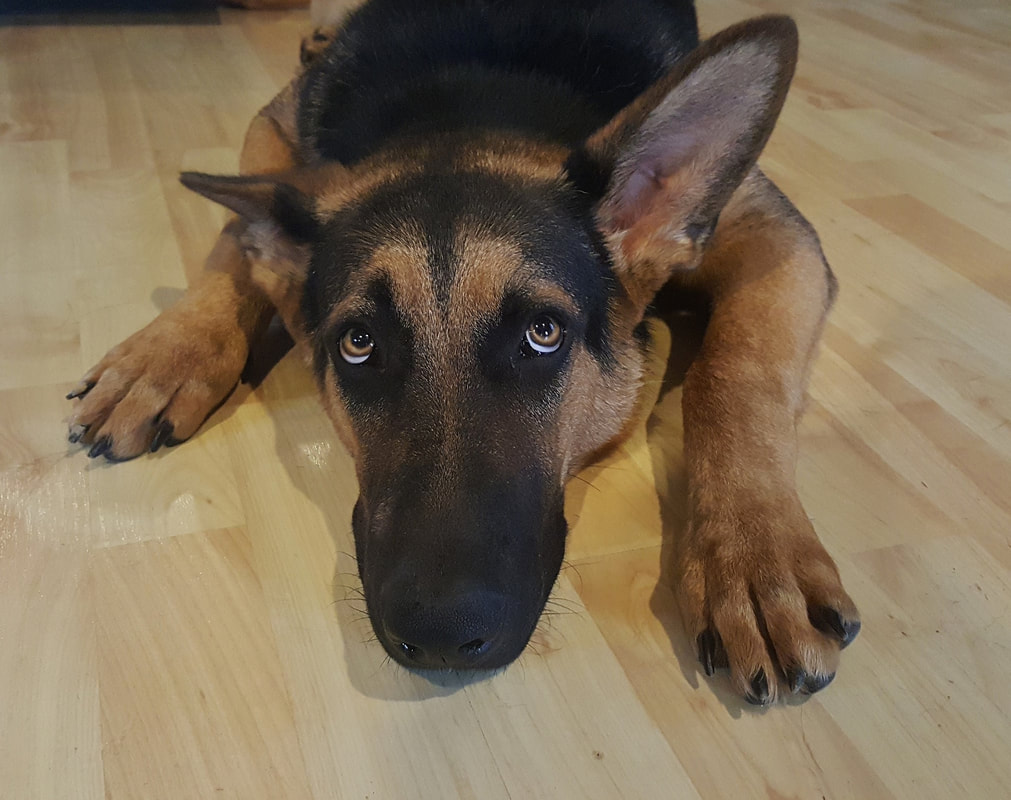|
Separation related problems and anxiety around unfamiliar people, dogs and environments are currently seen frequently in adolescent puppies which were acquired during the first lockdown. With limited access to the outside world and owners staying at home, many puppies were raised undersocialised, untrained or became over-attached to their owners. Puppies arriving in new homes during the current lockdown may face the same problems. Dogs are more likely to worry about things they haven't come across or had negative experiences about during the first 4 months of their lives. The great news is that you can use the current situation to your advantage. Strangers won't overwhelm your puppy with their affection and many other dogs will be on leads, so your pup won't learn to jump at every person or expect to play with every single dog it meets. You have more time to dedicate to training and teaching your pup that other dogs and people are safe, but generally boring, i.e. nothing to get excited or worry about. Socialisation is exposure with positive experiences and it does not have to be an interaction. Reassure, feed and play with your puppy, but never force interaction with something they are not yet comfortable about. Make sure all your household share caring responsibilities as well as handling and playing with the puppy. Introduce various household and outdoor sounds. Increase distancing if your puppy is worried and gradually build up the intensity of sounds. Allow them to watch various types of traffic, bicycles, joggers, prams, people with hats, rucksacks, walking sticks etc. from a safe distance. Walk them in a variety of weather and at different times of day. And don't forget that your puppy needs lots of time to sleep and relax.
2 Comments
Novelty items such as Christmas jumpers, reindeer antlers and festive hats can be scary for dogs. Some costumes may even prevent dogs from expressing their normal behaviour and restrict their movement. Although your dog may look cute they can feel uncomfortable or stressed. This is particularly true for dogs with no experience or bad memories of wearing clothes before. Watch this short video to learn how to train your dog to feel comfortable in their festive knitwear. Remember, never chase, restrain or corner your dog in order to put any clothes or harnesses on them. Instead let your dog happily come to you. Gradually build positive associations with new items using tasty treats. If they show any avoidance go back a step. Contact a vet or behaviourist if your dog shows aggression during handling. Make sure that you make most of your turkey, including all the bits of meat left over on the bones. You can not only make a nice stock to use for cooking, but also hundreds of training treats and frozen stuffing for your dog. You will need: Cooked turkey carcass (with some meat left on it), rice flour and eggs. 1. Training treats Boil turkey carcass (discard the skin and any parts that may contain lots of salt, spices and herbs as these may be harmful for your dog).
I’d like to share this cautionary tale (with the permission of an anonymous client) as an important message to everyone who has a sound fearful dog. The story is about a 2 year old German Shepherd who was referred to me by a vet due to his severe phobia of fireworks and other banging sounds. Recently the dog (let’s call him Biggy as he is a really big chap) started growling and snarling at his owners when they tried to approach him whilst fireworks were going off. Biggy has been scared of fireworks since he was a puppy – shaking, panting, pacing, refusing food and trying to hide under his owners’ bed. His lovely caring owners were worried about Biggy’s welfare so just before bonfire night they asked for some advice from a local “dog expert” who calls themselves a dog trainer and behaviourist and promised to cure their dog. The “dog expert” told them that Biggy just needs to understand the fireworks are not really dangerous and he will eventually get over it. The owners must make Biggy come out from under the bed where he usually hides from the fireworks, open the windows and force him to be exposed to all the bangs for the whole duration of the event by keeping him on a short lead and making him lie down. The owners, trusting the advice of this person, followed the instructions the next time fireworks were going off. First they managed to pull the terrified Biggy out from his safe den to face the scary noises. Biggy crouched down on the floor, not being able to escape, severely trembling, panting and salivating. After few minutes of struggling to calm him down they decided to let him go as Biggy was so scared that he’d wet himself. He rushed towards the bedroom to hide under the bed, but the door was shut (as advised by the “dog expert”). Panicking, Biggy started chewing the door frame and when the owner placed his hand on Biggy’s collar to pull him away from the door, Biggy snarled at him. To stop the destruction of the property the owner opened the door to let him into the bedroom, so that he could hide his head in his safe den under the bed.
Since then Biggy’s fear seemed to become much worse. He started looking anxious and worried every night as soon as it got dark outside, even if there weren’t any fireworks, and if his owners tried to approach him at these times he froze and growled at them. Biggy finds the loud bangs very dangerous and his coping strategy, hiding his head under the bed, was taken away by the people whom he used to trust. Thanks to the so called “dog expert”, Biggy’s fear of sounds has also become generalised to darkness and his owners. We now need to gradually teach him not only to relax in the presence of loud noises and darkness, but also to trust his owners again. He has also been prescribed some medication by his vet to help him during this process. As we approach the New Year another fireworks season will soon be upon us. If your dog is likely to be scared, please make sure they have a safe place to hide and never confine them or stop them from going there. Crates covered with heavy blankets placed in small rooms with no windows usually make a good refuge. Build positive associations with that place well in advance of fireworks. If you use background music to mask a noise, play it at other times as well, e.g. during games or treat chewing. During firework displays behave normally. If your dog responds to you, distract them with games, training or chews and never shout or punish them – they are scared enough already. Please ask your veterinary surgeon for suitable medication to help them throughout the firework season and relieve their suffering. Remember, this problem has a severe impact on your dog’s welfare and if not treated early, the fear will often get worse and generalise to other things. In January, when the firework season is over, will be the right time to start a behaviour modification programme to prepare them for next year. Consider consulting with a qualified and certified animal behaviourist. They will assess your dog’s behaviour and help you to gradually desensitise them to scary sounds by using science based, transparent and humane methods. Remember, legally anybody can call themselves an animal behaviourist or trainer, including those people using outdated and barbaric methods without deeply understanding the behaviour. Take due diligence by asking them lots of questions and asking to see copies of their diplomas or certificates before you do allow them to approach your canine friend. Have a stress free holiday. Dr Lilly Scott. Photo source: Pixabay |
Dr Lilly Scott
Clinical Animal Behaviourist / Animal Trainer / Researcher |



 RSS Feed
RSS Feed
